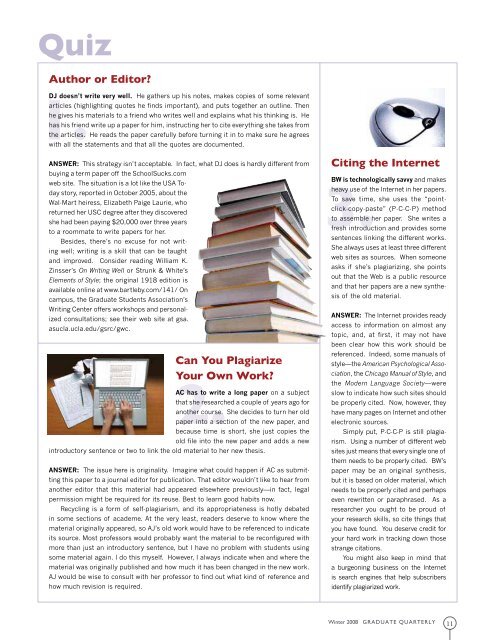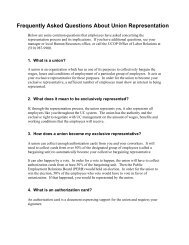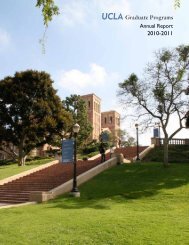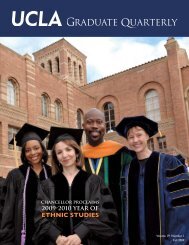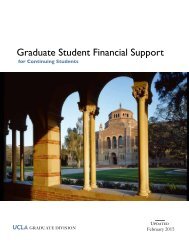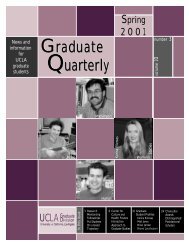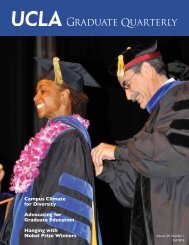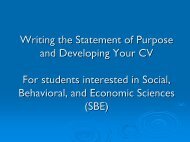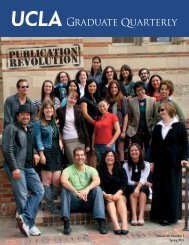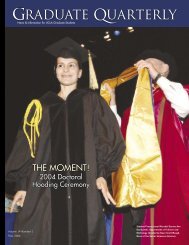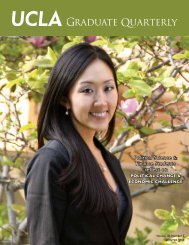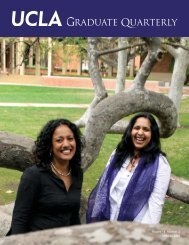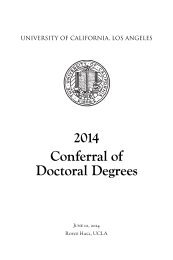Graduate Quarterly - Winter 2008 - UCLA Graduate Division
Graduate Quarterly - Winter 2008 - UCLA Graduate Division
Graduate Quarterly - Winter 2008 - UCLA Graduate Division
You also want an ePaper? Increase the reach of your titles
YUMPU automatically turns print PDFs into web optimized ePapers that Google loves.
Quiz<br />
Author or Editor?<br />
1.<br />
DJ doesn’t write very well. He gathers up his notes, makes copies of some relevant<br />
articles (highlighting quotes he finds important), and puts together an outline. Then<br />
he gives his materials to a friend who writes well and explains what his thinking is. He<br />
has his friend write up a paper for him, instructing her to cite everything she takes from<br />
the articles. He reads the paper carefully before turning it in to make sure he agrees<br />
with all the statements and that all the quotes are documented.<br />
ANSWER: This strategy isn’t acceptable. In fact, what DJ does is hardly different from<br />
buying a term paper off the SchoolSucks.com<br />
web site. The situation is a lot like the USA Today<br />
story, reported in October 2005, about the<br />
Wal-Mart heiress, Elizabeth Paige Laurie, who<br />
returned her USC degree after they discovered<br />
she had been paying $20,000 over three years<br />
to a roommate to write papers for her.<br />
Besides, there’s no excuse for not writing<br />
well; writing is a skill that can be taught<br />
and improved. Consider reading William K.<br />
Zinsser’s On Writing Well or Strunk & White’s<br />
Elements of Style; the original 1918 edition is<br />
available online at www.bartleby.com/141/ On<br />
campus, the <strong>Graduate</strong> Students Association’s<br />
Writing Center offers workshops and personalized<br />
consultations; see their web site at gsa.<br />
asucla.ucla.edu/gsrc/gwc.<br />
Can You Plagiarize<br />
Your Own Work?<br />
2.<br />
AC has to write a long paper on a subject<br />
that she researched a couple of years ago for<br />
another course. She decides to turn her old<br />
paper into a section of the new paper, and<br />
because time is short, she just copies the<br />
old file into the new paper and adds a new<br />
introductory sentence or two to link the old material to her new thesis.<br />
ANSWER: The issue here is originality. Imagine what could happen if AC as submitting<br />
this paper to a journal editor for publication. That editor wouldn’t like to hear from<br />
another editor that this material had appeared elsewhere previously—in fact, legal<br />
permission might be required for its reuse. Best to learn good habits now.<br />
Recycling is a form of self-plagiarism, and its appropriateness is hotly debated<br />
in some sections of academe. At the very least, readers deserve to know where the<br />
material originally appeared, so AJ’s old work would have to be referenced to indicate<br />
its source. Most professors would probably want the material to be reconfigured with<br />
more than just an introductory sentence, but I have no problem with students using<br />
some material again. I do this myself. However, I always indicate when and where the<br />
material was originally published and how much it has been changed in the new work.<br />
AJ would be wise to consult with her professor to find out what kind of reference and<br />
how much revision is required.<br />
Citing the Internet<br />
BW is technologically savvy and makes<br />
3.<br />
heavy use of the Internet in her papers.<br />
To save time, she uses the “pointclick-copy-paste”<br />
(P-C-C-P) method<br />
to assemble her paper. She writes a<br />
fresh introduction and provides some<br />
sentences linking the different works.<br />
She always uses at least three different<br />
web sites as sources. When someone<br />
asks if she’s plagiarizing, she points<br />
out that the Web is a public resource<br />
and that her papers are a new synthesis<br />
of the old material.<br />
ANSWER: The Internet provides ready<br />
access to information on almost any<br />
topic, and, at first, it may not have<br />
been clear how this work should be<br />
referenced. Indeed, some manuals of<br />
style—the American Psychological Association,<br />
the Chicago Manual of Style, and<br />
the Modern Language Society—were<br />
slow to indicate how such sites should<br />
be properly cited. Now, however, they<br />
have many pages on Internet and other<br />
electronic sources.<br />
Simply put, P-C-C-P is still plagiarism.<br />
Using a number of different web<br />
sites just means that every single one of<br />
them needs to be properly cited. BW’s<br />
paper may be an original synthesis,<br />
but it is based on older material, which<br />
needs to be properly cited and perhaps<br />
even rewritten or paraphrased. As a<br />
researcher you ought to be proud of<br />
your research skills, so cite things that<br />
you have found. You deserve credit for<br />
your hard work in tracking down those<br />
strange citations.<br />
You might also keep in mind that<br />
a burgeoning business on the Internet<br />
is search engines that help subscribers<br />
identify plagiarized work.<br />
<strong>Winter</strong> <strong>2008</strong> GRADUATE QUARTERLY<br />
11


